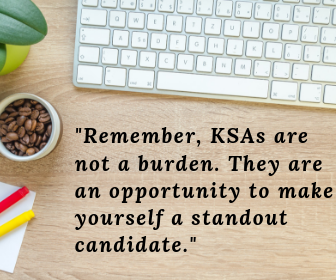If you are currently applying for a federal government job, the acronym KSA has probably taken up a substantial amount of headspace. The Knowledge, Skills, and Abilities model was created with the primary purpose of measuring a candidate’s qualities that sets them apart from others. However, this model is unique to federal agencies, and first-time applicants may be confused or unsure of how to approach this portion of the application. Luckily, writing your KSA narrative doesn’t need to be a burdensome process, you just need to know how to go about it.

Before we delve into the nitty gritty, revisit the listing of the job you are applying for. Because federal agencies require a KSA component, they incorporate the necessary knowledge, skills, and abilities into the job listing for you to reference. Even though the responsibilities aren’t neatly categorized, it’s fairly easy to assess them yourself to determine whether they fall under knowledge, skills, or abilities.
Knowledge refers to having a body of information, likely to be factual or procedural, which makes it possible for you to perform the necessary duties. For example, if you are applying for a physician’s position, you must have a strong theoretical background in medicine. Skill refers to the ability to perform specific tasks, which in the physician’s case, could include interpreting test results or being able to draw blood from a patient. To simplify the difference between the two, think about it like this: knowledge enables you to acquire a skill—not the other way around.
Abilities may seem similar to skills, but there is a difference. Think of your abilities as capabilities and capacities. It is a determinant of whether or not you are able to do something. Physical fitness is a good example—if you are in peak condition and are able to run for long periods of time, this gives you the ability to perform aspects of a firefighter’s job. Thereby, you may have the ability to perform parts of a job, even if you don’t have direct experience in the specific occupation or field.
After you have carefully revisited the job listing and identified the knowledge, skills, and abilities the ideal candidate possesses, take out a piece of paper and a pen. It’s time to brainstorm. Start thinking about your own experiences and write down all things that come to mind. Try categorizing them as knowledge, skills, or abilities. Reference the job listing and start drawing parallels. Ideally, you’ll be able to find more than one aspect of your personal history that overlaps with an aspect of the job. Identify the ones you can most strongly defend, as multiple pieces of evidence will make your case more compelling.
Once you feel confident that you’ve gathered all the necessary pieces, it’s time to start drafting your statements. Let’s consider a hypothetical situation: you are applying for a position that requires effective verbal and written communication, which is an ability. Grab your list and isolate the aspects of your history that demonstrate this ability the most.
Let’s pretend that you have the following three pieces of evidence: you graduated college with a 4.0 GPA, with a major in communications and a minor in creative writing, you have given presentations at corporate conferences, and in a previous role you created training materials. Now, rank them in order of significance. The academic focus on this area is very strong, and would come in first place, as it is an indisputable testament of your expertise in this area. The other two pieces of experiential evidence are interchangeable, as one pertains to verbal communication (presentations) and the other pertains to written communication (training materials).
Instead of starting off the statement with the college degree, you actually want to reverse the order in which you highlight your personal history. Ideally, your statement will flow from good, to better, to best. This increases the likelihood that the individual reading your application will mark you as a standout candidate. Why is this? Well, with three strong pieces of evidence it isn’t in your best interest to give the best one away immediately, as the other pieces that follow won’t measure up to the first one that was mentioned. By reversing the order, the person reading your application will see that you do have some solid experience in professional environments, only to be pleasantly surprised by the fact that you have a degree with an amazing grade point average in these areas.
As you craft your KSA statements, make sure to reference the job listing so that you don’t lose sight of your target. You want to directly address only those aspects about yourself that refer to qualities the job listing outlines. Writing about knowledge, skills, and abilities that don’t quite answer to any of the job responsibilities is a surefire way for your application to land into the wrong pile. Remember, KSAs are not a burden. They are an opportunity to make yourself a standout candidate and deserve to be crafted with care and confidence.

Leave a Reply